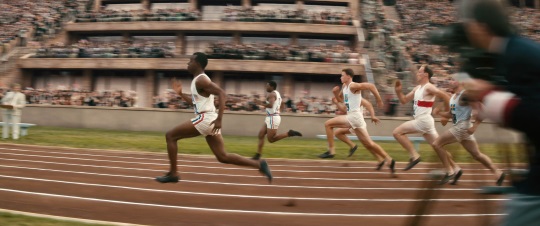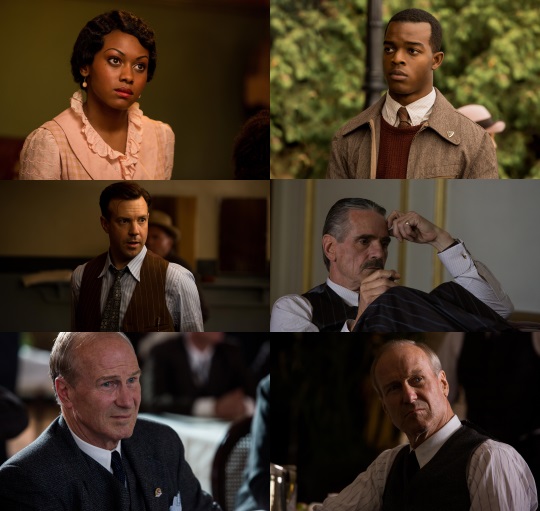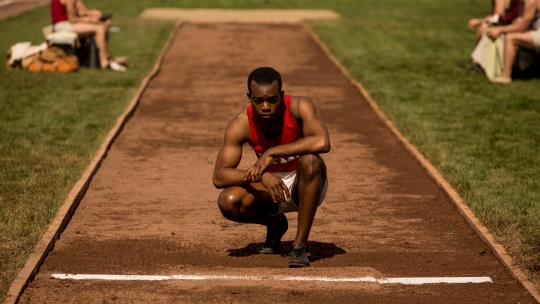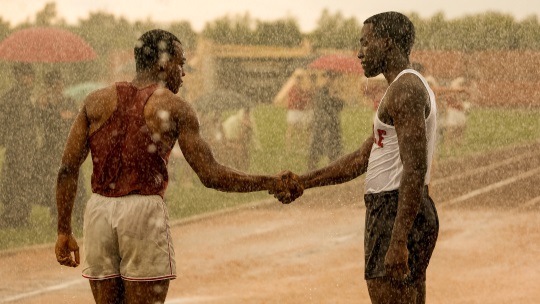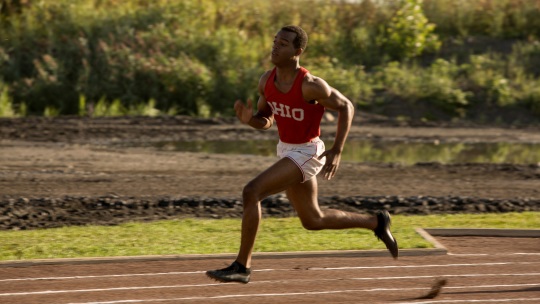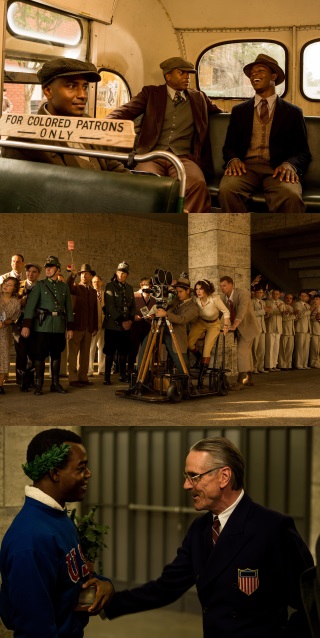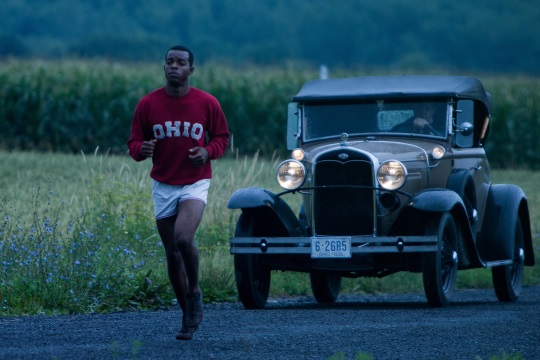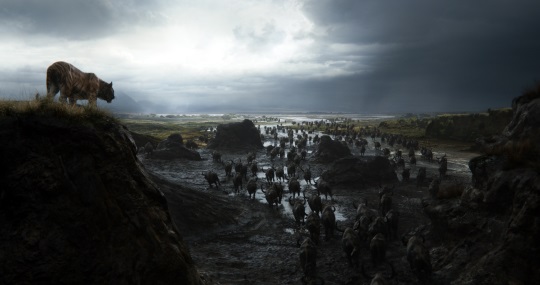Race The Real Story of Olympic Legend
Based on the incredible true story of Jesse Owens, the legendary athletic superstar whose quest to become the greatest track and field athlete in history thrusts him onto the world stage of the 1936 Olympics, where he faces off against Adolf Hitler’s vision of Aryan supremacy. Race is an enthralling film about courage, determination, tolerance, and friendship, and an inspiring drama about one man’s fight to become an Olympic legend.
People and Legend Jesse Owens is a global icon. Even in this information age when fame is fleeting, the four-time gold medal winner’s victory at the 1936 Berlin Olympics still resonates. His performance at the Games was a shining moment that lit up the world. 80 years later, Owens remains one of a handful of Olympic heroes whose name and image are an indelible part of our cultural heritage. Producer Luc Dayan, after developing and producing the award-winning short film Tribute to Jesse Owens and Carl Lewis, began to strive to get a movie about Owens made. He would be joined first by producer Jean-Charles Lévy, then by director Stephen Hopkins, and finally by an international coterie of filmmakers – which in itself speaks to Owens’ enduring impact on, and importance to, people all over the world.
Made with the cooperation of the Jesse Owens Foundation as well as the Owens family, Race is the first feature film about Owens. Lévy reports, “Before anything else, we went to the daughters of Jesse Owens and his wife Ruth Solomon. We wanted to convey to them what we hoped to achieve, the intended spirit of the movie, and how we invited their blessing. They were with us through the development process, and have been ever since.” In writing the screenplay for Race, Joe Shrapnel and Anna Waterhouse chose to focus on the most eventful years of the legendary runner’s life, beginning at the age of 19 when he first arrived at Ohio State University, and ending with his triumphant run(s) two years later on the world stage.
The World Staged Where to find an actor to embody a young man in the process of becoming a legend? The call went out far and wide, as “we had casting directors looking in the U.K., the U.S., Canada, and any other English-speaking country,” remembers producer Kate Garwood. “We saw hundreds of audition tapes and show reels before we hit upon Stephan James. I’d previously seen Stephan audition for something else as a British character. Now, that’s an accent which is not easy to get right and he handled it brilliantly. Turns out he could do an American one too…” In fact, the Canadian-born James had only recently incarnated another hero, civil rights activist and U.S. Congressman John Lewis in Selma. James admits that, going in, “I didn’t know a whole lot about Jesse; I knew who he was and had a general idea of what he had done. I quickly realized that his story went much deeper than one extraordinary display of athleticism. Race allows you to more fully understand the time and the circumstances and the conflicts that he lived in and navigated.” Offered the part, James accepted it because he believes it’s important that we tell these stories to every generation and never let them die, so that they are not swallowed up by history. That’s what this role represented for him.
James plunged into research – and training, since he was already active in sports including basketball, football, soccer, kickboxing, and track and field. The actor became consumed with doing justice to Jesse Owens’ unique running style and posture, and prepared tirelessly. He notes, “If you’re used to running a certain way – as I was – it can be difficult to break that habit.” As a result, James feels that, soon after filming began, he “became part of the world that Jesse lived in. The sets, the costumes, the people I was working with, all helped me feel like I was living Jesse’s life, walking – and running! – in his footsteps.”
Lapping the Field “With triumph and victory coming against the backdrop of the Nazi regime, we needed to create a visual juxtaposition between the dark and light elements of the story,” notes producer Kate Garwood. “Being able to shoot on the streets of Berlin was essential.” Although many of the U.S.-set scenes for Race were shot in and around Montréal, the crucial Olympics sequences were indeed shot in Berlin including at the Olympiastadion, the very arena in which Jesse Owens earned his medals – and which had been built for the 1936 Games. Adjacent to the still-standing stadium is a street named for Owens. The dormitory in Berlin where Owens resided during the Games was not available for filming in, because it has been restored as a living museum commemorating his accomplishments. Four weeks of filming in the German capital brought “a vital authenticity that could never have been achieved by reconstructing Berlin on movie sets,” says director Stephen Hopkins. So it was that when Stephan James emerged from the tunnel under the Olympic stadium onto the field, the actor was floored “to be standing in the exact spot where Jesse stood. I realized the enormity of the moment for him, and it took my breath away. I had chills. To think that he competed there with 100,000 people watching…I felt something like the immediacy and awe that he must have felt back in 1936.”
Olympia is in glorious black-and-white, and production designer David Brisbin and his team were hard-pressed to find color photography from that period. He remarks, “Even for everyday objects, the kind of record that is comparatively commonplace nowadays, there wasn’t much. Careful planning in pre-production allowed for everyone to be on the same page, or, as Brisbin quips, “the same 1930s song sheet.” Hopkins identified what he wanted visually and tonally from all departments, while set construction parameters were tagged for visual effects work that would extend or enhance imagery. Computer-generated re-creations ultimately included parts of Manhattan; the Los Angeles Coliseum; and flags and banners from U.S. universities. Hopkins comments, “Ultimately, to me the story is about a man who kept his soul intact when the world tried to force it out of him. He was under siege from all sides, but a beautiful heroism took hold. “Yet when I speak to his daughters, there was another lesson imparted: Jesse never once proclaimed himself to be a hero. It came from inside him, and he lived it out. Beyond even the amazing athletic prowess, that is a very rare quality indeed.”
Synopsis Race tracks the journey of James Cleveland “Jesse” Owens (portrayed by Stephan James of Selma). As a student and athlete in Depression-era America, Jesse bears the weight of family expectations, racial tension at his college Ohio State University, and his own high standards for competition. At Ohio State University, Jesse finds a savvy coach and stalwart friend in Larry Snyder (Jason Sudeikis) – who is unafraid to push the young man to his limits. Bolstered by the love and support of Ruth Solomon (Shanice Banton), with whom he has a young daughter, Jesse’s winning ways in intercollegiate competitions earn him a place on the U.S. Olympics team…if there is to be a team going to the 1936 Olympics at all; the American Olympic committee weighs a boycott in protest against Hitler with committee president Jeremiah Mahoney (Academy Award winner William Hurt) and millionaire industrialist Avery Brundage (Academy Award winner Jeremy Irons) debating the issue. Once Brundage prevails with the committee and U.S. participation is confirmed, Jesse enters a new racial and political minefield after he arrives in Berlin with his fellow athletes.
RACE Director: Stephen Hopkins Cast: Stephan James, Jason Sudeikis, Jeremy Irons, William Hurt Genre: Biography/Drama Category: IIA Duration: 135mins Trailer: https://youtu.be/KKJS_xZDQn8
|
|





